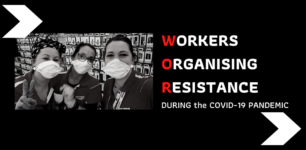Boycott Schools for COVID: An Interview With Workers Organising Resistance’s Kath Larkin

Over the last week, the risks that COVID-19 poses to Australians have become increasingly apparent. The prime minister’s ban on events involving more than 500 people came into play last Monday. And on Wednesday, a ban on non-essential indoor gatherings of more than 100 was enforced.
However, despite rising concerns within the community, so far, the Morrison government has seen fit to keep open rather large coronavirus incubators, that being schools.
So, while the general public is following enhanced social distancing rules, and many people who have been in a situation that’s potentially put them at risk are self-isolating, masses of students and their teachers are still being forced to turn up to school.
Early last week,2,500 doctors penned an open letter addressed to health minister Greg Hunt calling for the immediate closure of these facilities. While the Victorian state government has signalled that regardless of what the rest of the nation does, it will be shutting down its schools from Tuesday.
Just don’t show up
Workers Organising in Resistance (WOR) in the Pandemic is a group of concerned teachers, early childcare workers, parents and professional staff that’s mobilising against the Liberal National government’s lack of decisive action to contain the spread of the virus.
WOR is calling for a nationwide boycott of schools and childcare centres as of Monday 23 March, because if the government isn’t prepared to ensure the safety of those still being required to show up, then the public ought to be taking this responsibility upon itself.
Sydney Criminal Lawyers spoke to WOR spokesperson Kath Larkin about the risks involved with keeping educational institutions open, what she believes is behind the Morrison government’s reluctance to close them, and the related issue of pay for those who are forced to stay at home.
Firstly, Workers Organising Resistance in the Pandemic are running the National School and Childcare Boycott from Monday 23 March. What’s it going to involve?
We’re calling on all people involved in education to stay away from Monday onwards. That’s whether they’re teachers, early childhood educators, parents or students: anyone, who has anything to do with schools and early education centres.
We’re encouraging parents and students to send letters to their schools, explaining why they’re not going, and encouraging the schools to close down.
We also want the people who are staying away to take photos of themselves and post them on the event page.
So, while there are all these restrictions on meetings, we have to find other ways to organise. And we’re asking people to do a selfie from home campaign.
This situation around schools staying opening as the cases of COVID mount in this country is developing rapidly. What do you understand is happening at present?
Where we are right now, the number of confirmed cases in Australia is where Italy was a couple of weeks ago. So, we know that the situation can escalate extremely quickly.
There are already children being impacted. There’s a mother who’s got a seven-month-old baby in hospital with COVID-19. So, that’s why it’s really important we shut down the early childhood education centres as well.
We’ve also heard of at least one case in Adelaide, where it’s believed a student infected a teacher.
We’re not yet at the stage of Italy, or Iran, but we run a real risk of getting there if there aren’t early measures taken.
The World Health Organisation has repeatedly said aggressive early measures to prevent the spread are what’s needed in every country.
Where we see ourselves right now is at the spot where we may be able to slow this thing down and flatten that curve.
So, what are the implications of requiring social distancing, while some people are self-isolating, but at the same time, schools are being left open?
One of the things about Australia is that we have extremely limited testing. Even though it’s starting to be the case that there are community transmissions, you have to pass a very specific criteria to even get tested, because they just don’t have the resources to test everyone.
This requires that you have a fever that has reached a certain point, or you have been in touch with someone who’s a confirmed case, or you’ve been in touch with someone who’s been overseas. This means that a lot of people quite possibly have it but aren’t getting tested.
We also know with this virus that some people can be asymptomatic. So, not everyone is self-isolating. Not everyone can self-isolate or are even aware that they have the illness.
We’ve banned indoor gatherings of over one hundred people, but schools can’t meet that. Most schools have over a hundred people between the workers and the students.
Even if they try to keep them all separate in different classrooms, if you’ve got 20, 30 or 40 people in a classroom, there’s still pretty big risks posed there, in terms of the possibility of transmitting the virus.
The other risk too is that it’s not just about the people at the schools. All those people are potentially bringing that back home.
They go home to their families where they may live with older people. They may live with very young babies, who are particularly vulnerable.
We also know that many of these people are using public transport to get to school. So, there’s a risk of community transmission there.
These are all reasons why we just can’t have these other measures alone. We really need to shut down the schools as well.
Last week, children at some schools were told they can no longer use water bubblers or fill up water bottles, and therefore, they must carry all their water to school.
Doesn’t sending children to school without free-flowing drinkable water pose some duty of care issues?
I can understand not using water bubblers that multiple kids might put their mouths on. That’s obviously an issue for transmission.
But, if they’re bringing their water in bottles, then there needs to be an ability to refill them.
Without touching the sides of the water bottles is difficult. You would need adults to be supervising the refilling of bottles. It would all get pretty challenging.
There are so many little things that we wouldn’t be thinking are issues in schools. And that’s why they should be closed.
There are obviously those issues outside of the bubblers. So, if children weren’t going to schools, then there wouldn’t be any of these issues.
There are lists being posted on social media showing that a lot of other countries have already shut down their schools, with the Australian government standing out as an anomaly.
Why do you think the Morrison government is not following suit?
It’s been abundantly clear from the beginning of this crisis that Morrison does not care about ordinary people. His only concern is the market and profits.
Even when we look at the stimulus package, it’s targeted almost entirely at business. We’ve seen layoffs, or in the case of Qantas, rolling stand downs, despite these massive government bailouts. And there are no strings attached. He actually doesn’t care.
We’ve seen a total lack of funding going to health. And there are workers in hospitals who can’t get access to masks.
Of course, we also know that when there was the announcement to ban gatherings of over 500, Morrison held off on the implementation of the ban until after a Hillsong gathering.
There are a bunch of things that Morrison has done that show his primary concern is for profit, and not ordinary people. And the schools are totally connected to that.
If they did close schools, then they’d have to find a way to provide for the parents. Every time teachers take strike action, the economy takes a hit as all these other sections of the economy are impacted, because workers have to stay home and look after their children.
That’s what they’re avoiding more than anything else. But, we do need people to be at home. And while we are on that topic, people need to be paid.
It’s really important that we’re not just saying shut down the schools, and that’s it. We’re also saying that all education and school workers have to be paid for the period that they’re off.
The parents from other businesses need to receive a wage while they stay home and look after their children. It’s a vital service that they’re providing for the whole community.
And in the instance where there are children of essential service workers who cannot get other childcare, then we do have to look at safe ways of providing for those people.
They’ve done that in other countries. You can have small-scale classrooms, and childcare facilities, that just have a few students involved, with high ratios of supervisors to students.
In those instances, there needs to be extremely stringent cleaning. And there should be temperature checks. That’s one of the measures that they’ve used in other countries. If a child turns up with a fever, them they can then be sent home.
There are ways for those where it’s absolutely necessary to provide some form of childcare, but it has to be done in a particular way to keep those people safe. And clearly, you can’t do that if you simply have every child going to school.
And lastly, the ongoing boycott starts on Monday. As you know, the Victorian government has flagged going it alone and placing its own state-wide ban on schools. Kath, how long do you think the Morrison government is likely to keep this up?
It’s hard to tell. This situation is such a moving feast – it’s constantly changing. We know in Italy, the spread started to jump quickly.
The fact that the Victorian government is already telling people that they’re going to shut down schools, you’d think would add pressure.
But, for how long, I don’t know. I would expect them to be closed within a week or two anyway. Every single day though makes a huge difference, when we’re dealing with this virus.
I don’t think it will be tenable to keep schools open forever. But, they’re more likely to shut them down sooner if we can get a clear message from the community. If we have teachers and parents staying away from schools.
There are huge numbers of petitions. On Change.org, there are over 800 people who have submitted COVID petitions, with hundreds being particularly about school closures. And when you put all of those together, there are thousands signing for schools to close.
We know that 2,500 doctors have signed an open letter last week calling for schools to close. So, the more pressure that we can build up, the quicker the schools will close.







